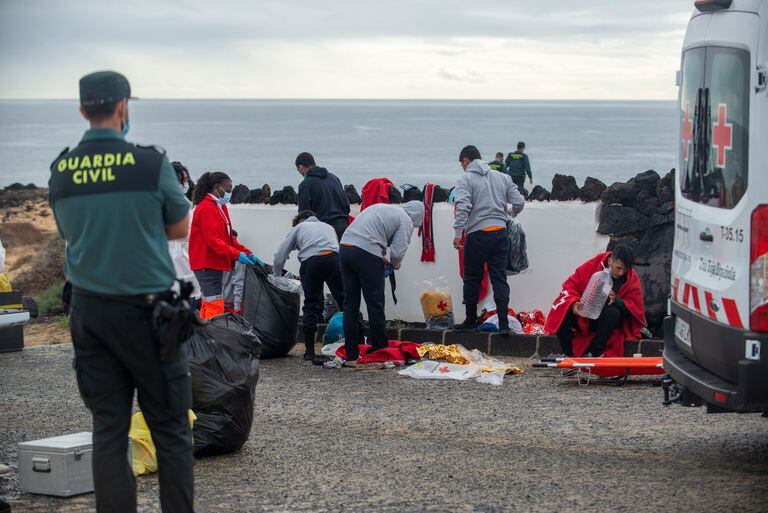The emergency services attend to a group of migrants who arrived in Lanzarote last week.Javier Fuentes Figueroa / EFE
The European Commission considers that the movement towards the west of the Mediterranean of the routes of irregular migration will force Morocco to assume new commitments in its effort to control the flows that arrive in Spain.
The European Commissioner for the Interior, Ylva Johansson, who visited Rabat this week, is willing to study a financial compensation mechanism to help the Moroccan government face the costs of the new migration crisis.
Johansson assured this Tuesday in the Moroccan capital that the mechanism claimed by Morocco "will be discussed" with the authorities of the Maghreb country.
And although she did not give details, the commissioner acknowledged that the migratory crisis that the Canary Islands endure forces Brussels to strengthen its collaboration with Morocco, among other things, to accelerate the return of irregular migrants without the right to asylum.
The European border agency (Frontex) points out that during the month of October irregular arrivals to the Canary Islands have multiplied by 10 over the monthly figure of a year ago, reaching 5,300 people.
In the first 10 months of this year, the figure rises to 11,400, with most arrivals registered since August.
Frontex details that sub-Saharan countries are the origin of most of these people.
The migratory situation in the south of Spain will even trickle into the European summit next week (December 10 and 11).
The draft conclusions of that meeting underline the need to collaborate with the southern neighborhood of the continent to guarantee "a more secure and stable region.
The text defends the need to strengthen the EU's dialogue with its southern neighbors.
And it is committed to supporting this relationship "with the efficient use of our financial instruments", in a signal of response to the demands for financial assistance from countries such as Morocco that have become the exit point towards the EU of irregular migration of their own or from third countries.
Johansson's department recalls that "the EU already gives great support to Morocco for the management of irregular migratory flows and border management."
The same sources acknowledge that the neighboring country "has been essential in the western route of the Mediterranean since the flows reached their peak in 2018".
And they add that "in 2020 new challenges have arisen, with the route to the Canary Islands, which may require new commitments from the Moroccan authorities."
Morocco has so far received € 343 million in EU aid for border management (the bulk of that amount, since 2015).
It is the second largest aid package in the entire southern neighborhood of the EU, behind only Libya.
But the needs seem to be increasing and the intensification of the migratory crisis adds the economic impact of the Covid-19 pandemic.
As a result of the Covid-19, the Commission, according to official sources, has committed to reallocate or advance some 450 million "to respond to the exceptional budgetary needs of Morocco."
Brussels has already disbursed more than half of that figure (264 million to date).
And the community solidarity effort has been joined by investment channeled through European financial institutions, which, according to the Commission, stands at a portfolio of almost 1,000 million euros a year.
Morocco, however, seems to demand more aid or, at least, the disbursement of the promised one so far.
But the EU is in the middle of its own budget crisis, with the accounts for 2021 and the financial framework for the next few years blocked by Hungary and Poland, which are resisting greater control of the rule of law within the community club.
With the 2020 accounts about to expire and the 2021 accounts pending negotiation, Brussels acknowledges that until the end of this year the margin to offer more resources to Morocco is practically exhausted.
The aid against the pandemic still pending amounts to 186 million euros.
"But we have no margin to meet the commitments this year," they indicate in the Commission.
Part of this aid, adds the Commission, will have to be disbursed in 2021, a year that, for budgetary purposes, is still full of uncertainty in the EU.
The Commission is also offering € 40 million from a budget support line for border management, available until September 2021 and expected to be disbursed over the next year.
In total, 226 million that could arrive during the next year and alleviate the situation.

